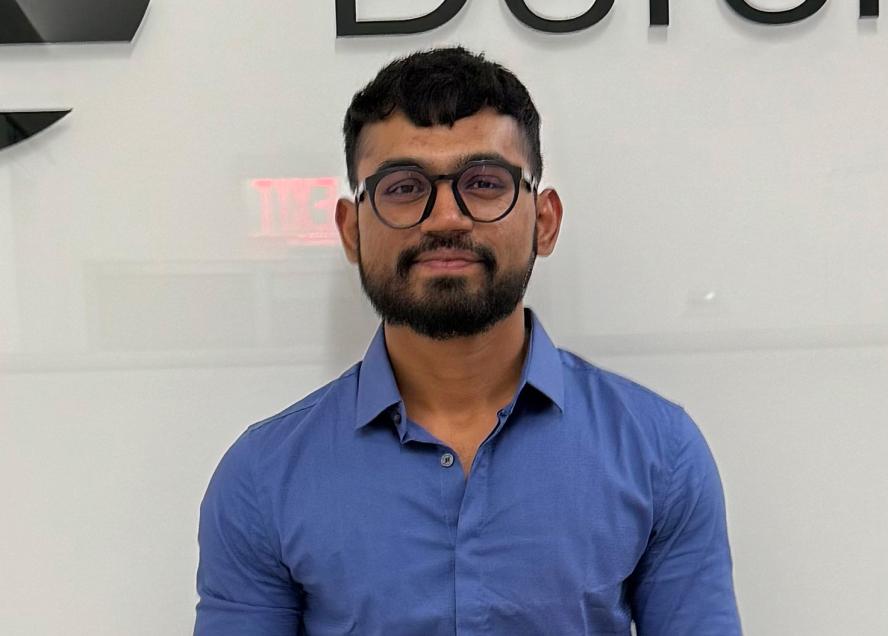Using AI to Detect AI

By: Maisie O'Brien
Modern AI technology is enabling anyone with an internet connection and basic computer skills to digitally alter video and audio to imitate another’s likeness – usually with malicious intent. These “deepfakes” are no longer science fiction imaginings, but a growing global concern.
Dharva Khambholia, AG25, learned about deepfakes as a student in the Tufts MS in Data Analytics program and immediately recognized the broad threat this new technology poses. For the past four months, he has been working for a startup that uses AI to equip governments, enterprises, and critical infrastructure systems with real-time detection tools that identify deepfakes and synthetic media before they cause harm.
“This technology is dangerous in all kinds of ways,” Khambholia says. “I always think about this scenario: If someone could imitate my voice, then they could call my parents and claim I was in trouble and ask them to wire me money. My parents could easily be scammed. Working to prevent people from falling victim to fraud really motivates me.”
In order to safeguard an organization from fraud, Khambholia acts as a bad actor trying to break and circumvent existing security mechanisms using AI tools. As deepfakes become more advanced, cyber crimes and the need for added security to combat them have increased.
“It’s an interesting, exciting time to be in this field,” says Khambholia. “Deepfake detection is constantly evolving, and I often feel like I’m sailing through uncharted waters.”
Khambholia credits his time at Tufts with preparing him for his current role. “Tufts not only gave me the data analysis and statistical tools I use everyday, but it also helped me to communicate my findings effectively,” he says. “A big part of my job is presenting my work and analysis to leadership. There’s a lot of storytelling involved.”
Khambholia always wanted to do impactful work. Prior to attending Tufts, he earned a BA in computer science from SRM Institute of Science and Technology in India where he gained a broad understanding of computer science, software, and coding, and was drawn to new technologies. After completing two internships related to data analytics, he enrolled at Tufts.
Khambholia chose Tufts because of its interdisciplinary curriculmn. “The Data Analytics program allows you to customize your coursework to fit your background and interests,” he says. “I loved the freedom to take courses in different departments and I found the optional introductory courses to be really helpful.”
Khambholia particularly enjoyed his courses in Big Data, Python, and GIS. His favorite course was on Deep Learning, a subset of machine learning that uses neural networks to analyze data and learn complex patterns. Taught by Professor of the Practice of Data Analytics Shuo Zhang, the course touched on how deep learning can be applied to multiple modalities, including audio.
“When I took Professor Zhang’s course, I didn’t have a clear direction,” Khambholia says. “There’s so much you can do in this field and I hadn’t found my passion. When Professor Zhang described extracting information from audio, speech, and music clips and applying deep learning techniques, I was fascinated. As a musician, it really appealed to me.”
Zhang introduced Khambholia to Professor Jennifer Williams from the University of Southampton in the United Kingdom, a senior academic well-known for her work on audio deepfakes. Professor Williams offered Khambolia a summer internship as part of an international project with AUKUS nations (Australia, UK, US) that she leads on AI regulation in safety-critical systems. During his internship, Khambholia researched generative audio AI technologies and worked to develop an audio deepfake data set focusing on accent and emotion differences.
“This internship has been one of the biggest milestones in my journey so far,” he reflects. “I collaborated with students from Tufts and universities across the world, and I met so many knowledgeable, passionate professionals working at the forefront of AI safety.” His internship ultimately led him to his current job in deepfake detection.
“I am so grateful for Professor Zhang,” says Khambholia. “He is such a wonderful mentor. He pointed me in the right directions and connected me to other great colleagues and mentors. Because of his guidance, I’ve found myself exploring ideas I had never considered before.”
As Khambholia is launching his career, he hopes to continue doing impactful work and make his parents proud. When he’s not working or studying, he enjoys playing the guitar in a post-punk band.